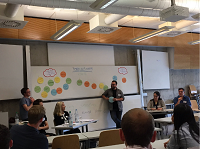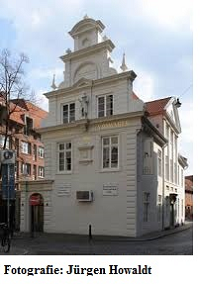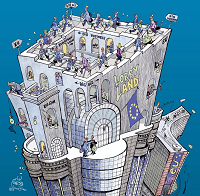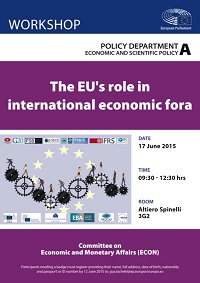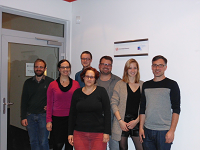Presentation and discussion on Dec 8th in the FVGThe research group Transnational Political Ordering and Global Finance is now complete and is starting its work under the direction of Prof. Dr. Sebastian Botzem. The group is located at InIIS and also belongs to the Center for Transnational Studies. In addition to Prof. Botzem, Natalia Besedovsky, Sebastian Möller and Marcus Wolf belong to the team. The research group investigates the development of a social and political order beyond the nation state.
The team focusses on institutional rules, ideational foundations and cross-border relationships of individuals and organizations in the field of global finance. In particular, the group is interested in the emergence of collective decision-making in the transnational realm. Binding transnational rules are as much elements of these ordering processes as are resistance and opposition against them. Particular emphasis is given to private/commercial actors and social movements/civil society actors whose activities are going to be analyzed in a historical and comparative fashion.
Sebastian Botzem has worked at InIIS since February this year and investigates the topic of cross-border regulation of financial markets and transnational governance. Before, as a research fellow of the Berlin Social Science Center (WZB) he investigated the role of private and public actors in global standardization processes. Sebastian obtained his Diploma in Political Science at the Otto-Suhr-Institut and in 2008 his PhD at the School of Business and Economics, both at the FU Berlin. His PhD thesis addresses standards of globalization, in particular cross-border regulation of financial reporting as path creation and is a precursor to his book “The Politics of Accounting Regulation” (2012, Edward Elgar). During his international research visits, which included Stockholm, Oxford and Cambridge (MA), he devoted his work to explore the development of the financial industry. His research interests focus on how private rules are made binding for third parties, transnational governance as well as transnational dynamics of political order formation. His current research project analyses global payment systems.
Natalia Besedovsky is a postdoctoral research associate at InIIS. She studied sociology at the University of Cologne and recently handed in her dissertation at the Humboldt-University Berlin. Prior to joining InIIS, Natalia was a Fulbright scholar at Princeton University and research assistant at the Max Planck Institute for the Studies of Societies in Cologne, Germany, as well as a research associate at the Berlin Social Science Center (WZB). Her research interests include financial markets, expertise-networks, epistemic cultures and calculative practices, as well as questions of how to link theory and empirical research in Social Science. Her dissertation project focuses on the credit rating industry and how their calculative practices shape concepts of risk.
Sebastian Möller has been a research associate in the research group since October 2014 and is also a doctoral student at the Social Science Faculty of the University of Bremen. He holds a BA degree in Political Science and History from the University of Wuppertal and a MA degree in Political Science from the Goethe University Frankfurt. At both universities, Sebastian was also employed as student and teaching assistant. Before studying International Relations and Political Economy at the University of Southampton (UK) for one semester, he had worked as research assistant at the Peace Research Institute Frankfurt (PRIF). Besides transnational regulation of global finance, his research interests include the EU´s trade policy and the rise of emerging markets from the Global South.
Marcus Wolf has been a research associate in the research group since September 2014 and is also a doctoral student at the Social Science Faculty of the University of Bremen. He received his bachelor degree in Philosophy and Social Sciences from the Humboldt University of Berlin and his master degree in Political Economy of European Integration from the Berlin School of Economics and Law. From November 2011 to September 2014 he has worked as a student assistant in the project group Modes of Economic Governance at the Berlin Social Science Center (WZB). His main research interests lie in the field of International Political Economy and Economic Sociology, particularly in the role that interest groups play in the governance of global finance.
The research group will present and discuss its research program at the joint InIIS-BIGSSS-Colloquium on December 8 (4-6pm, FVG, Room W0060).
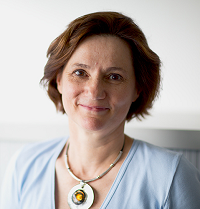 Eve Chiapello, Research Director at the École des Hautes Études en Sciences Sociales (EHESS), Paris
Eve Chiapello, Research Director at the École des Hautes Études en Sciences Sociales (EHESS), Paris

